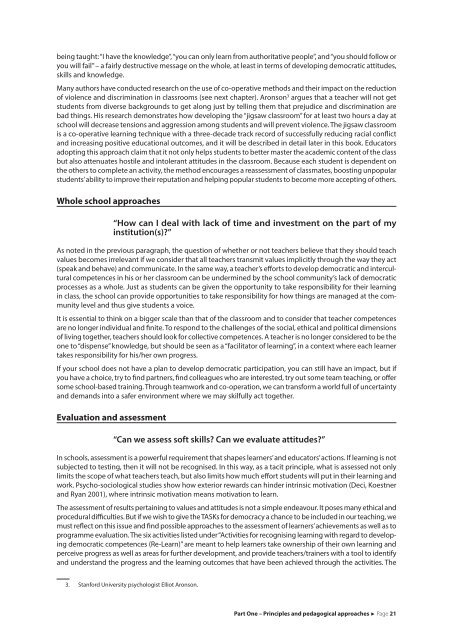TASKs for democracy
4NYw4W
4NYw4W
Create successful ePaper yourself
Turn your PDF publications into a flip-book with our unique Google optimized e-Paper software.
eing taught: “I have the knowledge”, “you can only learn from authoritative people”, and “you should follow or<br />
you will fail” – a fairly destructive message on the whole, at least in terms of developing democratic attitudes,<br />
skills and knowledge.<br />
Many authors have conducted research on the use of co-operative methods and their impact on the reduction<br />
of violence and discrimination in classrooms (see next chapter). Aronson 3 argues that a teacher will not get<br />
students from diverse backgrounds to get along just by telling them that prejudice and discrimination are<br />
bad things. His research demonstrates how developing the “jigsaw classroom” <strong>for</strong> at least two hours a day at<br />
school will decrease tensions and aggression among students and will prevent violence. The jigsaw classroom<br />
is a co-operative learning technique with a three-decade track record of successfully reducing racial conflict<br />
and increasing positive educational outcomes, and it will be described in detail later in this book. Educators<br />
adopting this approach claim that it not only helps students to better master the academic content of the class<br />
but also attenuates hostile and intolerant attitudes in the classroom. Because each student is dependent on<br />
the others to complete an activity, the method encourages a reassessment of classmates, boosting unpopular<br />
students’ ability to improve their reputation and helping popular students to become more accepting of others.<br />
Whole school approaches<br />
“How can I deal with lack of time and investment on the part of my<br />
institution(s)?”<br />
As noted in the previous paragraph, the question of whether or not teachers believe that they should teach<br />
values becomes irrelevant if we consider that all teachers transmit values implicitly through the way they act<br />
(speak and behave) and communicate. In the same way, a teacher’s ef<strong>for</strong>ts to develop democratic and intercultural<br />
competences in his or her classroom can be undermined by the school community’s lack of democratic<br />
processes as a whole. Just as students can be given the opportunity to take responsibility <strong>for</strong> their learning<br />
in class, the school can provide opportunities to take responsibility <strong>for</strong> how things are managed at the community<br />
level and thus give students a voice.<br />
It is essential to think on a bigger scale than that of the classroom and to consider that teacher competences<br />
are no longer individual and finite. To respond to the challenges of the social, ethical and political dimensions<br />
of living together, teachers should look <strong>for</strong> collective competences. A teacher is no longer considered to be the<br />
one to “dispense” knowledge, but should be seen as a “facilitator of learning”, in a context where each learner<br />
takes responsibility <strong>for</strong> his/her own progress.<br />
If your school does not have a plan to develop democratic participation, you can still have an impact, but if<br />
you have a choice, try to find partners, find colleagues who are interested, try out some team teaching, or offer<br />
some school-based training. Through teamwork and co-operation, we can trans<strong>for</strong>m a world full of uncertainty<br />
and demands into a safer environment where we may skilfully act together.<br />
Evaluation and assessment<br />
“Can we assess soft skills? Can we evaluate attitudes?”<br />
In schools, assessment is a powerful requirement that shapes learners’ and educators’ actions. If learning is not<br />
subjected to testing, then it will not be recognised. In this way, as a tacit principle, what is assessed not only<br />
limits the scope of what teachers teach, but also limits how much ef<strong>for</strong>t students will put in their learning and<br />
work. Psycho-sociological studies show how exterior rewards can hinder intrinsic motivation (Deci, Koestner<br />
and Ryan 2001), where intrinsic motivation means motivation to learn.<br />
The assessment of results pertaining to values and attitudes is not a simple endeavour. It poses many ethical and<br />
procedural difficulties. But if we wish to give the <strong>TASKs</strong> <strong>for</strong> <strong>democracy</strong> a chance to be included in our teaching, we<br />
must reflect on this issue and find possible approaches to the assessment of learners’ achievements as well as to<br />
programme evaluation. The six activities listed under “Activities <strong>for</strong> recognising learning with regard to developing<br />
democratic competences (Re-Learn)” are meant to help learners take ownership of their own learning and<br />
perceive progress as well as areas <strong>for</strong> further development, and provide teachers/trainers with a tool to identify<br />
and understand the progress and the learning outcomes that have been achieved through the activities. The<br />
3. Stan<strong>for</strong>d University psychologist Elliot Aronson.<br />
Part One – Principles and pedagogical approaches Page 21


